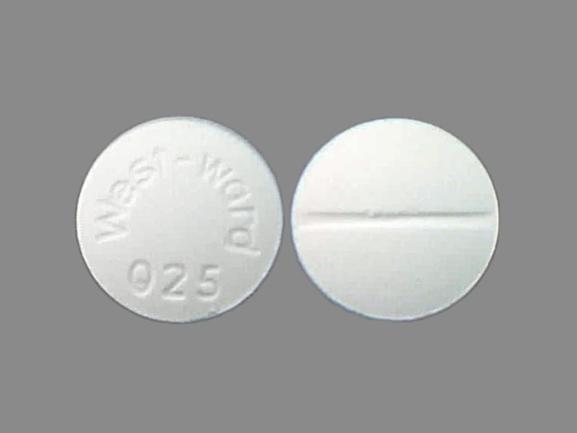Aminophylline and Alcohol/Food Interactions
There are 2 alcohol/food/lifestyle interactions with aminophylline.
Aminophylline Caffeine
Moderate Drug Interaction
MONITOR: Coadministration of two or more sympathomimetic agents may increase the risk of adverse effects such as nervousness, irritability, and increased heart rate. Central nervous system (CNS) stimulants, particularly amphetamines, can potentiate the adrenergic response to vasopressors and other sympathomimetic agents. Additive increases in blood pressure and heart rate may occur due to enhanced peripheral sympathetic activity.
MANAGEMENT: Caution is advised if two or more sympathomimetic agents are coadministered. Pulse and blood pressure should be closely monitored.
References (7)
- Rosenblatt JE, Lake CR, van Kammen DP, Ziegler MG, Bunney WE Jr (1979) "Interactions of amphetamine, pimozide, and lithium on plasma norepineophrine and dopamine-beta-hydroxylase in schizophrenic patients." Psychiatry Res, 1, p. 45-52
- Cavanaugh JH, Griffith JD, Oates JA (1970) "Effect of amphetamine on the pressor response to tyramine: formation of p-hydroxynorephedrine from amphetamine in man." Clin Pharmacol Ther, 11, p. 656
- (2001) "Product Information. Adderall (amphetamine-dextroamphetamine)." Shire Richwood Pharmaceutical Company Inc
- (2001) "Product Information. Tenuate (diethylpropion)." Aventis Pharmaceuticals
- (2001) "Product Information. Sanorex (mazindol)." Novartis Pharmaceuticals
- (2001) "Product Information. Focalin (dexmethylphenidate)." Mikart Inc
- (2002) "Product Information. Strattera (atomoxetine)." Lilly, Eli and Company
Switch to consumer interaction data
Aminophylline High Blood Pressure (Hypertension)
Moderate Potential Hazard, Moderate plausibility
methylxanthines - tachyarrhythmias
The use of theophyllines is associated with an increase in heart rate which may progress to supraventricular tachycardia or ventricular arrhythmia at high serum drug concentrations. Appearance of cardiac adverse effects is generally an indication of theophylline toxicity, although patients with a history of tachyarrhythmias may be more susceptible to the chronotropic effect of these drugs. Therapy with theophyllines should be administered cautiously in such patients. Caution is also advised in patients with hypertension, hyperthyroidism, angina pectoris, or recent myocardial infarction, since high dosages of the drugs are associated with positive inotropic as well as chronotropic effects. Clinical monitoring of serum drug concentrations is recommended to prevent toxicity.
References (12)
- Hendeles L, Weinberger M, Johnson G (1978) "Monitoring serum theophylline levels." Clin Pharmacokinet, 3, p. 294-312
- Sessler CN (1990) "Theophylline toxicity: clinical features of 116 consecutive cases." Am J Med, 88, p. 567-76
- Schiff GD, Hegde HK, LaCloche L, Hryhorczuk DO (1991) "Inpatient theophylline toxicity: preventable factors." Ann Intern Med, 114, p. 748-53
- Marchlinski FE, Miller JM (1985) "Atrial arrhythmias exacerbated by theophylline: response to verapamil and evidence for triggered activity in man." Chest, 88, p. 931-4
- Levine JH, Michael JR, Guarnieri T (1985) "Multifocal atrial tachycardia: a toxic effect of theophylline." Lancet, 1, p. 12-4
- Taniguchi A, Ohe T, Shimorura K (1989) "Theophylline-induced ventricular tachycardia in a patient with chronic lung disease: sensitivity to verapamil." Chest, 96, p. 958-9
- Bittar G, Friedman HS (1991) "The arrhythmogenicity of theophylline: a multivariate analysis of clinical determinants." Chest, 99, p. 1415-20
- Patel AK, Skatrud JB, Thomsen JH (1981) "Cardiac arrhythmias due to oral aminophylline in patients with chronic obstructive pulmonary disease." Chest, 80, p. 661-5
- Albert S (1987) "Aminophylline toxicity." Pediatr Clin North Am, 34, p. 61-73
- Milgrom H, Bender B (1993) "Current issues in the use of theophylline." Am Rev Respir Dis, 147, s33-9
- Chazan R, Karwat K, Tyminska K, Tadeusiak W, Droszcz W (1995) "Cardiac arrhythmias as a result of intravenous infusions of theophylline in patients with airway obstruction." Int J Clin Pharmacol Ther, 33, p. 170-5
- Mccarthy M (1997) "Theophylline, beta-agonists, and cardiovascular death." Lancet, 349, p. 33
Switch to consumer interaction data
Aminophylline drug interactions
There are 269 drug interactions with aminophylline.
Aminophylline disease interactions
There are 7 disease interactions with aminophylline which include:
More about aminophylline
- aminophylline consumer information
- Check interactions
- Compare alternatives
- Pricing & coupons
- Reviews (1)
- Drug images
- Side effects
- Dosage information
- During pregnancy
- Drug class: methylxanthines
- Breastfeeding
- En español
Related treatment guides
Drug Interaction Classification
| Highly clinically significant. Avoid combinations; the risk of the interaction outweighs the benefit. | |
| Moderately clinically significant. Usually avoid combinations; use it only under special circumstances. | |
| Minimally clinically significant. Minimize risk; assess risk and consider an alternative drug, take steps to circumvent the interaction risk and/or institute a monitoring plan. | |
| No interaction information available. |
See also:
Further information
Always consult your healthcare provider to ensure the information displayed on this page applies to your personal circumstances.


